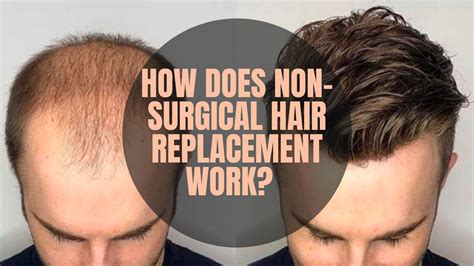With an estimated 200 million people suffering from hair loss, the demand for non-surgical hair replacement has surged in recent years. This article provides an in-depth guide to the three most popular non-surgical hair replacement solutions, exploring their effectiveness, cost, and potential side effects.

Non-surgical hair replacement refers to a range of treatments that restore hair to the scalp without surgery. These treatments aim to conceal hair loss, provide additional volume, and improve hair density.
1. Toppers and Hairpieces
Pain Points: Thinning hair, bald spots, partial hair loss
Motivations: Restore hair density, conceal hair loss, add volume
Toppers and hairpieces are partial hair prosthetics that cover the crown or specific areas of the scalp. They utilize clips, combs, or adhesives to attach to the existing hair, instantly providing coverage and volume.
2. Scalp Micropigmentation (SMP)
Pain Points: Male-pattern baldness, diffuse hair thinning, hair loss scars
Motivations: Create the illusion of a fuller scalp, reduce the appearance of bald spots, enhance hair density
SMP involves injecting tiny pigments into the scalp, mimicking the appearance of natural hair follicles. It is a semi-permanent solution that provides a stubble-like texture, giving the illusion of a shaved head or thicker hair.
3. Cold Laser Therapy (CLT)
Pain Points: Mild to moderate hair loss, thinning hair
Motivations: Stimulate hair growth, improve scalp circulation, reduce hair shedding
CLT uses a laser device to emit low-level light energy onto the scalp. This energy is believed to stimulate hair follicles, promote hair growth, and reduce hair loss. It is a non-invasive and painless treatment that requires multiple sessions.
The best non-surgical hair replacement solution depends on the individual’s hair loss pattern, severity, and lifestyle preferences. Here is a comparison of the three options:
| Feature | Toppers & Hairpieces | Scalp Micropigmentation | Cold Laser Therapy |
|---|---|---|---|
| Cost | $500-$2,000+ | $1,000-$4,000+ | $500-$2,000+ |
| Permanence | Temporary | Semi-permanent (1-3 years) | Non-permanent |
| Maintenance | Daily attachment/removal | None | Weekly sessions |
| Daily Styling | Yes | Limited | No |
| Effectiveness | Good for partial hair loss | Good for male-pattern baldness | Moderate for hair thinning |
| Side Effects | No major side effects | Potential for slight skin irritation | No known side effects |
- Instant results
- Non-invasive and painless
- Affordable compared to surgery
- Customizable to meet individual needs
- Can boost confidence and self-esteem
Hair loss can have a profound impact on an individual’s self-image and well-being. Non-surgical hair replacement offers a compassionate and effective solution to restore hair, boost confidence, and improve quality of life.
The global non-surgical hair replacement market is projected to reach $7.4 billion by 2025. This growth is driven by advancements in technology and the increasing demand for minimally invasive solutions.
Innovative Technologies:
- Bio-integrated hair implants
- Stem cell therapy
- Nanobot hair restoration
These technologies aim to provide long-lasting and effective solutions for hair loss.
- Consult with a reputable hair restoration specialist
- Research the different options to find the best solution for your needs
- Use high-quality products and accessories
- Follow proper maintenance and care instructions
- Manage expectations and understand the limitations of non-surgical treatments
Conclusion
Non-surgical hair replacement has emerged as a transformative solution for those seeking to address hair loss without surgery. By understanding the different options available, their effectiveness, and the latest innovations, individuals can make informed decisions and find the perfect non-surgical hair replacement solution to meet their needs.
